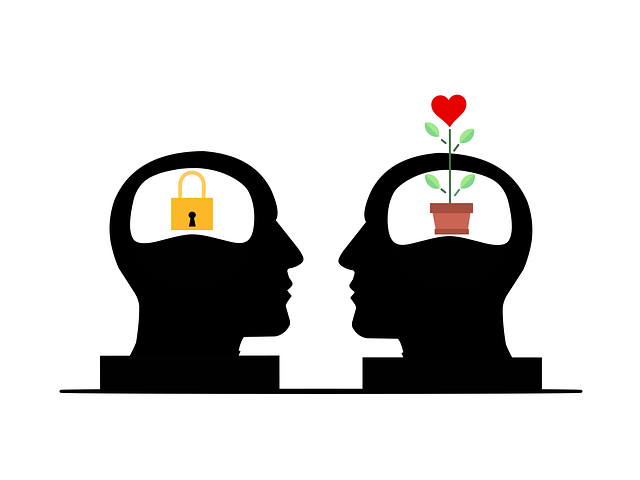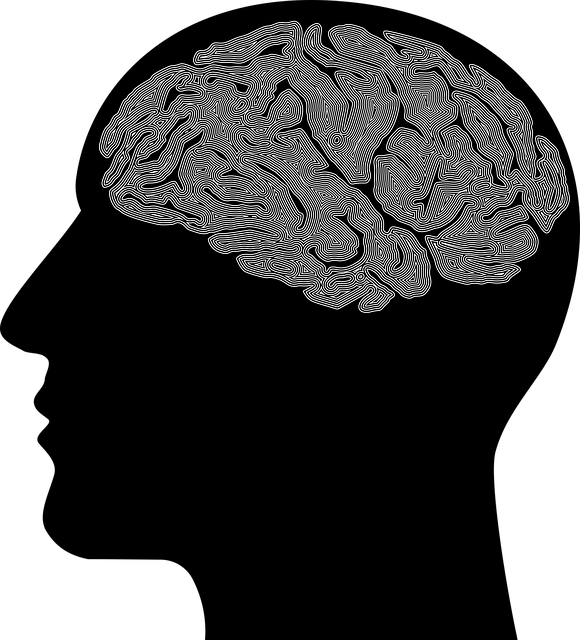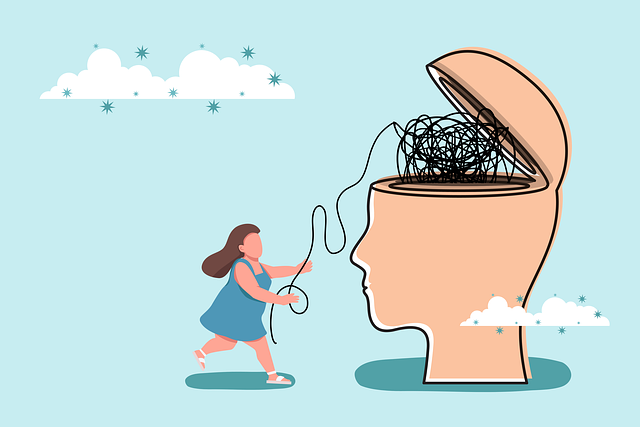In today's fast-paced world, mental wellness is paramount, and self-assessment tools play a crucial role in recognizing and addressing various mental health concerns, including eating disorders like those treated at Englewood Eating Disorders Therapy. These tools empower individuals to take control of their well-being through accurate emotional state evaluations and tailored treatment planning. Effective self-assessments facilitate early intervention, prevention strategies, and improved patient outcomes, especially for healthcare providers prone to burnout. An ideal mental wellness assessment includes diverse questions on emotional well-being, stress, anxiety, depression, and eating disorders, utilizing evidence-based practices like Compassion Cultivation and CBT. Englewood Eating Disorders Therapy leverages these methods to create user-centric, dynamic self-assessment tools that promote personalized growth and recovery journeys, aligning with best practices in mental health policy. Continuous improvement strategies based on data and user feedback ensure the relevance and effectiveness of these tools over time.
Mental wellness self-assessment tools are gaining prominence in the pursuit of holistic mental health. This article explores the development of such tools, highlighting their crucial role in empowering individuals to take charge of their mental well-being. We delve into key components, evidence-based practices, user experience design, and effectiveness measurement strategies, drawing insights from Englewood Eating Disorders Therapy’s successful implementation. Discover how these elements converge to create accessible, engaging, and impactful self-assessment tools.
- Understanding the Need for Self-Assessment Tools in Mental Health
- Key Components of an Effective Mental Wellness Self-Assessment
- Integrating Evidence-Based Practices into Self-Assessment Development at Englewood Eating Disorders Therapy
- User Experience and Design Considerations for Accessible and Engaging Self-Assessments
- Measuring Effectiveness and Continuous Improvement Strategies for Self-Assessment Tools
Understanding the Need for Self-Assessment Tools in Mental Health

In today’s fast-paced world, mental wellness is as crucial as physical health, and self-assessment tools play a pivotal role in recognizing and addressing various mental health concerns. These tools empower individuals to take charge of their well-being by providing an accurate evaluation of their emotional state and potential areas of improvement. For instance, those seeking Englewood Eating Disorders Therapy can benefit from comprehensive self-assessments that offer insights into their relationship with food and body image, which is essential for tailored treatment planning.
Self-assessment tools are particularly valuable in early intervention and prevention strategies. By regularly monitoring mental health, individuals can identify warning signs of common issues such as depression or burnout, especially among healthcare providers. Healthcare Provider Cultural Competency Training emphasizes the need for these tools to bridge cultural gaps and improve patient outcomes. Additionally, Burnout Prevention Strategies for Healthcare Providers can be effectively implemented through self-assessments, ensuring professionals recognize their limits and take proactive measures to maintain a healthy work-life balance, thus indirectly contributing to Depression Prevention efforts.
Key Components of an Effective Mental Wellness Self-Assessment

An effective mental wellness self-assessment tool should incorporate several key components to ensure it’s comprehensive and beneficial for users seeking support, such as those considering Englewood Eating Disorders Therapy. Firstly, it must include a range of questions that assess different aspects of mental health, including emotional well-being, stress levels, anxiety, depression, and any signs of eating disorders. These questions should be designed using evidence-based practices like Compassion Cultivation to foster self-compassion and reduce stigma.
Additionally, the tool should facilitate self-reflection through open-ended communication strategies that encourage users to elaborate on their feelings and experiences. This promotes deeper understanding and can help identify underlying issues. Burnout prevention is another vital component, with questions tailored to recognize signs of burnout and provide opportunities for users to explore coping mechanisms and self-care practices. By integrating these elements, a mental wellness self-assessment becomes a powerful starting point for personalized support, guiding users towards resources like Englewood Eating Disorders Therapy.
Integrating Evidence-Based Practices into Self-Assessment Development at Englewood Eating Disorders Therapy

At Englewood Eating Disorders Therapy, we understand that integrating evidence-based practices is paramount in developing effective self-assessment tools for mental wellness. By incorporating strategies such as Cognitive Behavioral Therapy (CBT), Mindfulness-Based interventions, and Dialectical Behavior Therapy (DBT), our therapists ensure that the self-assessment process is both reliable and valid. This approach leverages scientific research to provide a comprehensive understanding of an individual’s mental health status, catering to diverse needs within our community.
Englewood Eating Disorders Therapy prioritizes the latest evidence in stress management workshops, conflict resolution techniques, and burnout prevention strategies for healthcare providers. These integrated practices not only enhance the accuracy of self-assessments but also foster a supportive environment where individuals can accurately reflect on their emotional well-being. As a result, our clients gain valuable insights that promote personal growth and recovery journeys tailored to their unique circumstances.
User Experience and Design Considerations for Accessible and Engaging Self-Assessments

Creating self-assessment tools for mental wellness must prioritize user experience to ensure accessibility and engagement. A well-designed platform that accommodates various needs is essential, especially when targeting vulnerable populations like those struggling with eating disorders. Incorporating intuitive navigation, clear language, and visually appealing interfaces can make a significant difference in user adoption and adherence. The layout should be simple and uncluttered, allowing users to focus on the content without overwhelming sensory input.
Interactive elements, such as quizzes with personalized feedback, can enhance engagement while providing valuable insights into an individual’s mental health status. Incorporating features that adapt to the user’s responses, like branching narratives or dynamic questions, can make the assessment experience more dynamic and relevant. For instance, a tool tailored for depression prevention could offer targeted exercises for self-awareness based on initial assessment results. This personalized approach not only improves engagement but also aligns with best practices in mental health policy analysis and advocacy by promoting early intervention and accessible care.
Measuring Effectiveness and Continuous Improvement Strategies for Self-Assessment Tools

Effective mental wellness self-assessment tools are not merely static; they evolve and improve over time. Measuring their effectiveness is a key step in this process. This involves collecting user feedback, comparing assessment outcomes with established mental health benchmarks, and analyzing the tool’s impact on users’ well-being. For instance, at Englewood Eating Disorders Therapy, we’ve found that incorporating Stress Reduction Methods and Crisis Intervention Guidance into our self-assessment tools has significantly enhanced client engagement and improved their ability to recognize and manage early warning signs.
Continuous improvement strategies should be data-driven, adaptive, and user-centric. Regular updates based on feedback can ensure the tool remains relevant and effective in changing mental health landscapes. Incorporating practices like Mindfulness Meditation into these tools can also promote resilience and empower individuals to take charge of their mental wellness. This iterative approach allows for a dynamic self-assessment experience that is not only valuable but also adaptable to individual needs, ultimately enhancing the overall effectiveness of mental health support initiatives.
The development of mental wellness self-assessment tools, as demonstrated by practices at Englewood Eating Disorders Therapy, is a vital step towards improving access to mental health care. By integrating evidence-based practices and prioritizing user experience, these tools can empower individuals to take an active role in their mental health journey. Continuous improvement strategies ensure these assessments remain effective, engaging, and accessible, ultimately fostering better mental wellness outcomes.














